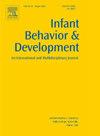幼儿对熟悉单词的分段和超分段错误发音的敏感性。
IF 2
3区 心理学
Q3 PSYCHOLOGY, DEVELOPMENTAL
引用次数: 0
摘要
最近的研究表明,19 个月大的儿童在认字任务中对辅音和元音的错误发音表现出分级敏感性。这表现在当错误发音越来越偏离正确的词形(如/dog/变成/gog/、/kog/或/sog/)时,他们对相关对象(如狗)的注意力会逐渐减弱。尽管有这些敏感性,但其广泛的通用性仍存在不确定性,特别是在词的起始音和韵母之间的差异,以及词性分段(辅音和元音)和超分段(如词性重音和声调)元素之间的差异。本研究旨在填补这些空白。我们使用联运偏好范式进行了两项实验,以评估幼儿对尾音和词性声调错误发音的反应。实验结果表明,随着发音错误的严重程度增加,幼儿对熟悉对象的注意力呈线性下降趋势。此外,我们的研究结果还表明,学步儿童在词汇处理过程中会利用这些细节信息。这些研究结果使我们对幼儿早期词汇表征中的语音结构有了更全面的了解,从而揭示了幼儿在处理不同词位、不同声学维度和多种语言时所使用的机制。本文章由计算机程序翻译,如有差异,请以英文原文为准。
Toddlers' sensitivity to segmental and suprasegmental mispronunciations of familiar words
Recent research has shown that children as young as 19 months demonstrate graded sensitivity to mispronunciations in consonant onsets and vowels in word recognition tasks. This is evident in their progressively diminishing attention to relevant objects (e.g., a dog) as mispronunciations increasingly deviate from the correct word form (such as /dog/ changing to /gog/, /kog/, or /sog/). Despite these sensitivities, uncertainties remain about their broad generalizability, especially regarding the differences between word onsets and codas, and between lexical segmental (consonants and vowels) and supra-segmental (e.g., lexical stress and tones) elements. The present study aimed to fill these gaps. Using the intermodal preferential paradigm, we conducted two experiments to evaluate toddlers’ responses to coda and lexical tone mispronunciations. Our results revealed a linear decline in toddlers' attention to familiar objects as mispronunciations became more severe, suggesting that by 19–20 months, infants' lexical representations encompass detailed phonetic information of both segmental and supra-segmental categories. Moreover, our results indicate that toddlers utilize these details in lexical processing. Such findings offer a more comprehensive understanding of the phonetic structures within toddlers' early lexical representations, sheding light on the mechanisms toddlers use in processing various word positions, across different acoustic dimensions, and in multiple languages.
求助全文
通过发布文献求助,成功后即可免费获取论文全文。
去求助
来源期刊

Infant Behavior & Development
PSYCHOLOGY, DEVELOPMENTAL-
CiteScore
4.10
自引率
4.80%
发文量
94
期刊介绍:
Infant Behavior & Development publishes empirical (fundamental and clinical), theoretical, methodological and review papers. Brief reports dealing with behavioral development during infancy (up to 3 years) will also be considered. Papers of an inter- and multidisciplinary nature, for example neuroscience, non-linear dynamics and modelling approaches, are particularly encouraged. Areas covered by the journal include cognitive development, emotional development, perception, perception-action coupling, motor development and socialisation.
 求助内容:
求助内容: 应助结果提醒方式:
应助结果提醒方式:


